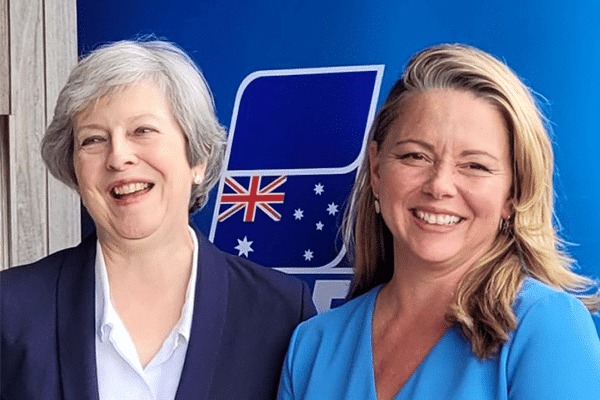Zoe Mackenzie (1989)
“Lauriston taught me actual languages: French and English. University taught me other languages: German and Spanish, as well as the language of the law. My career has taught me the languages of business, government, media and politics.”
In 2022 Zoe McKenzie was endorsed by the Liberal party to stand as the member for Flinders. This is a fitting culmination of her leadership experience and roles over the years, her passionate attitude of service, and her affinity with community.
The following story is adapted from a speech Zoe delivered to Lauriston students as part of their Career Expo, where a diverse range of courageous alumni speak to senior students about their experiences after graduating from Lauriston. It was also published in our June 2020 edition of Lauriston Life.

Embracing ambiguity, change and opportunity.
Embracing ambiguity, learning from failure, to be creative in seeking solutions and helping others, and to be inspired to be opportunity finders and problem-solvers and collaborators are values held by Zoe. Her varied career path is a perfect illustration of embracing ambiguity, change and opportunity – from her work in France as part of an education think tank to her roles on the boards of the Australia Council for the Arts and Melbourne University Humanities Foundation.
Zoe says that critical thinking – the ability to critical think, assess, identify bias and manipulation, to reason, rationalise, identify truth and falsehood – was one of the most valuable skills she gained from Lauriston. And her invitation to participate in a Year 8 Leadership Program with another girl in her year was the surprising catalyst for a life-long love of literacy and leadership in all its guises.
‘I was a painfully quiet girl and wasn’t sure why the School picked me, but, like most things at Lauriston, I embraced the opportunity.
‘We joined a hundred or so other students from schools across Melbourne and listened to leaders from all kinds of domains – politics, sports, humanitarian work – and we discussed what it meant to be a leader. It is one of my most distinct memories from Lauriston. It was probably the first time I interacted with people who are called “leaders” in our system. But it was certainly not the last.’
‘If there is one lesson Lauriston taught me, it is this: you can be a leader. While at school all the skills of leadership are developed, including reason, critical thinking, an ability to analyse, argue, and bring others with you. At home, with parents, family and community, we develop the many values of leadership including listening, self-discipline and compassion. All it takes from here is hard work, and lots of it.’
Zoe has had the privilege of working with many remarkable and successful leaders across myriad fields. She has met and worked alongside a number of Australian Prime Ministers, Ministers, State and Territory Premiers, and, to no one’s more greater surprise than her own, had long corridor chats with the Presidents of France, Italy and the United States. In various capacities she has worked with many of Australia’s ASX 100 CEOs and Chairs, the Vice Chancellors of our universities, and the CEOs, Directors and Artistic Directors of our greatest cultural institutions.
‘Leaders – as I know them – are just like you and me. They are not superhuman: they are hard working, and worthy of our gratitude in their pursuit of our interests. Amongst those people I have met who are truly remarkable, many do not aspire to leadership. I find the superhuman qualities of kindness, wisdom, curiosity and excellence in the writers, the dancers, the sculptors, the teachers, the sportswomen and their coaches, the dedicated parents, and the volunteers.
Zoe comments that although they were a nascent stage of the complex program that exists today, Lauriston’s many leadership opportunities taught her how to think, how to explain, how to bring people along with her, and how to understand and respect them if she fails. Debating was one of the most important skills she gained at Lauriston ad honed at University; it taught her how to search for and empathise with arguments which were not her own.
‘I tend to see all meaningful skills as versions of languages.
‘Lauriston taught me actual languages: French and English. University taught me other languages: German and Spanish, as well as the language of the law. My career has taught me the languages of business, government, media and politics.
‘I spend most of my professional life translating one language to speakers of the other and I am surprised, in this era, how many people remain monolingual. By this I do not mean they only speak English. I mean that they only speak business, or they only speak bureaucratese.
‘The modern world seems to require each of us to understand and speak multiple languages. There is enormous value in being able to put yourself in the shoes of your interlocutors, and speak to them in a language they understand.’
When Zoe left School, law was a natural starting place for developing her interest in government and languages, and she particularly enjoyed the practice of industrial relations, which she describes as ‘effectively a legal setting for the jostle for power between employers and unionised labour.’
But it was at university, while working part-time for the then Attorney General in the Kennett Government, that Zoe had her first taste of policy-making. She found the lego-like exercise of designing systems enthralling, and when the chance to work with the Federal Attorney General came up after a few years of legal practice, she leapt at the chance.
Later, she returned to law, then to senior policy roles in education, communications, the arts and, finally, to international trade because she felt more ‘useful and impactful there’.
Zoe has a strong element of public service in her DNA which she attributes this to her mother, who instilled a certain sense of duty: If you are smart, you must apply it to be useful to others. This philosophy of giving back for the greater good of the community is part of the broader base of learning literacies embedded in Lauriston’s curriculum and is considered a vital mindset for young people in today’s every-changing world.
SHARE THIS ON

